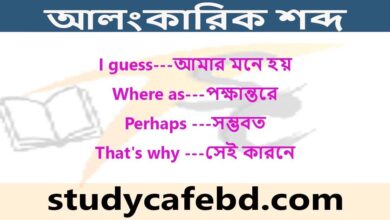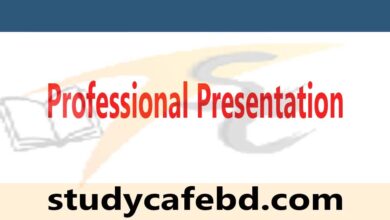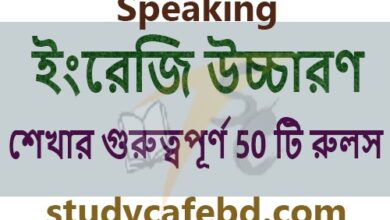Formal and Informal English কাকে বলে, উদাহরণ সহ।
Table of Contents
Formal and Informal English বলতে কি বোঝায়?
Formal English কাকে বলে?
স্থান, কাল ও পাত্র ভেদে যে ভাষার ব্যবহার করা হয় তাকে Formal English বলে ।
যেমনঃ
- Would you mind giving a pen?
উক্ত বাক্যটি কোন বন্ধুর উদ্দেশ্যে ব্যবহার করা যুক্তিসঙ্গত হবে না কারণ বন্ধুর ক্ষেত্রে সব সময় Informal English ব্যবহার করা হয়।
উপরের ইংরেজি বাক্যটি একজন বন্ধুর ক্ষেত্রে আমরা এভাবে ব্যবহার করতে পারি Give me a pen, will you?
এ বাক্যটি অবশ্যই Informal English. Formal English ব্যবহার হয় Formal way তে অর্থাৎ রীতিসিদ্ধভাবে কিন্তু Informal English ব্যবহার Informally অর্থাৎ সরাসরিভাবে । আমাদের দৈনন্দিন জীবনে Formal & Informal English-এর পার্থক্য জানা খুবই প্রয়োজন কারণ এটি ভাষার সঠিক ব্যবহার শেখায়।
Formal ও Informal English– এর তফাৎ জানাটা শিক্ষার্থীর জন্য খুবই গুরুত্বপূর্ণ কারণ যে উপলক্ষে ভাষা ব্যাবহার হয় সে উপলক্ষের সঙ্গে তা সঙ্গতিপূর্ণ হতে হবে এবং যাকে উদ্দেশ্য করে লেখা হয় বা বলা হয় তার সঙ্গে লেখকের বা বক্তার সম্পর্ক অনুযায়ী শব্দ চয়ন বা বাক্য গঠন করতে হবে। তা না হলে ভুল বুঝাবুঝি হতে পারে অথবা হাসির উদ্রেক করতে পারে।
যেমন কোন বন্ধুকে যদি বলা হয় “Would you mind closing the door?” তাহলে সেটা appropriate বা যথাযথ হবে না বরং হাস্যকর হবে কারণ এটা formal language এবং একজন বন্ধুর সাথে আমরা formal language এ কথা বলি না।
আমরা যদি একজন অপরিচিত ভদ্র লোককে বলা হয় ” Shut the door, will you?” তাহলে এটা যথাযথ হবে না কারণ এটা informal language এবং এ ধরনের ভাষা কোন অপিরিচিত লোকের প্রতি ব্যাবহার করলে তিনি অসুন্তুষ্ট হতে পারেন বা রেগে যেতে পারেন।
তাই শুধু বাক্য শুদ্ধ হলে চলবে না, কোন উপলক্ষে বা কোন পরিস্থিতিতে বা কার সঙ্গে কথা বলছি বা কাকে লিখছি সেটা মনে রেখে শব্দ চয়ন ও বাক্য গঠন করতে হবে। আমাদের দেশে ইংরেজী শিখাতে গিয়ে এই বিষয়টির প্রতি গুরুত্ব দেওয়া হয় না, ফলে আমরা যে ইংরেজী লিখি এবং বলি সেটা প্রায়শ : অসঙ্গতিপূর্ণ, অভদ্রজনোচিত অথবা হাস্যকর হয়। তাই formal ও informal English সমন্ধে পরিষ্কার ধারণা থাকা দরকার।
নিম্নে Formal and Informal English এর কিছু উদাহরণ দেয়া হল।
[su_table responsive=”yes”][su_table]| Formal English | Informal English |
| Brief | Short |
| Demonstrate | Show |
| Shortly | Soon |
| I am sorry | Sorry |
| Begin | Start |
| Ensure | Make sure |
| Return | Back |
| Take back | Bring |
| Remove | Take off |
| Refer | Mention |
| Broadcast | Show |
| I believe | I think |
| Attempt | Try |
| Sadly | Unfortunately |
| Uncommon | Unusual |
| Vacant | Empty |
| Scared | Afraid |
| Incorrect | Wrong |
| Perhaps | May be |
| May | Could |
| Fortunate | Lucky |
| A lot | Very much |
| A great deal off | A lot of |
| Defeated | Beaten |
| Allow | Let |
| Cut down | Reduce |
| Unite | Get together |
| Prepare | Cook |
| Continue | Go on |
| Mix up | Confuse |
| Accept | Take |
| Approximately | About |
| Thank you | Thanks |
| Hello | Hi |
Formal and Informal English এর কিছু উদাহরণ বাক্য আকারে দেয়া হল।
[su_table responsive=”yes”][su_table]| Formal English | Informal English |
| I will acquaint him with the facts. | I will let him know the facts |
| The examination will commence on 20th June. | The exam will begin on 20 June |
| He hails from Khulna. | He comes from Khulna. |
| I located him in the library | I found him in the library. |
| He has purchased a cycle. | He has bought a cycle. |
| He resides in Banani | He lives in Banani. |
| We require help. | We want help. |
| Please step this way. | Come this way. please |
| She alighted from the train. | She got off train. |
| When did you return. | When did you get back. |
| He resemble his father. | He takes after his father. |
| I need cup of milk | I could do with a cup of milk. |
| He does not smoke. | I could do with a cup of milk. |
| You are very kind. | You’re very kind. |
| Goodbye. | So long. |
| It is a please to meet you. | Nice to meet you. |
| I beg your pardon. | What? |
| He was married last year. | He got married last year. |
formal and informal English exercises with answers





